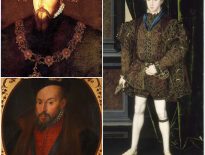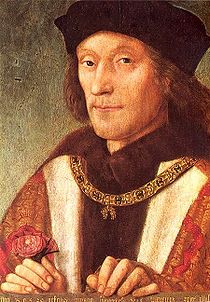In this week's Claire Chats talk, I am continuing my series on the Tudor monarchs, and examiningg their reigns for "the good, the bad, the ugly", i.e. their achievements and the not-so-good stuff, by looking at the reign of the second Tudor monarch, King Henry VIII.
King Henry VIII is an iconic monarch known more for his treatment of his six wives and the awful executions of his reign, but what about his achievements? Did he do anything good for his country and people?
Please do share your views in the comments section too - thank you!
More talks on Henry VIII:
- Video – Henry VIII: Renaissance Prince
- Video – Henry VIII: Tyrant Part 1
- Video – Henry VIII: Tyrant Part 2
Expert talks on Henry VIII:
- December Expert – Gareth Russell – Henry VIII as a military leader
- Henry VIII's Health by Kyra Kramer
Further reading
- A Brief History of Britain 1485-1660 by Ronald Hutton
- Henry: Virtuous Prince by David Starkey
- Henry VIII by J J Scarisbrick
- Any of the books on Henry VIII by Robert Hutchinson
- See our Henry VIII Books page for recommended reading.
- https://www.rmg.co.uk/discover/explore/henry-viii-and-his-navy
- https://www.historyextra.com/period/tudor/robert-hutchinson-kings-queens-weekend-henry-viii/
- https://www.parliament.uk/about/living-heritage/evolutionofparliament/originsofparliament/birthofparliament/overview/reformation/
- http://www.bbc.co.uk/history/british/tudors/majesty_menace_01.shtml
- https://getrevising.co.uk/revision-cards/henry-viii-government-and-parliament
- https://www.english-heritage.org.uk/about-us/our-places/forts-and-defences/
- https://www.independent.co.uk/news/people/profiles/henry-viii-henry-the-horrible-90938.html



I am sure that most people didn’t believe the Supremacy or Church of England to be achievements but acts which divided Christendom and which caused much suffering throughout the Kingdom, including the holy monks and friars and great men of state including Thomas More and John Fisher.
However, I agree most of the other things, the naval reorganization and defence, the English Bible and independent status, the palaces, his prowess in sport and dancing, education, founded schools and colleges, he was a Renaissance Prince and he loved the arts and scientific advances, his footprint is on England today were real achievements. He also sorted out the exploitation of his father’s reign and clamped down on personal fraud in government. However, the other side of the coin, the fall out of his religious and political changes don’t need to be listed, they are obvious.
He was an astute political manipulator, he moved from one foreign policy to another, but in fact to keep the balance of power, although his decisions were affected by his domestic policies and which wife was in the ascendancy at the time. He lost his best advisor on foreign policy when he dismissed Cardinal Wolsey but gained his best administrator in Thomas Cromwell. His execution of Thomas More lost him the one man who possibly could have curbed his excessive destruction in the name of greed and power. Henry didn’t cease to be a humanist, but it becomes a bit hard to find evidence for this during his last decade as he sweeps away the instructions which provided this education and scholarship. Henry was even forced to refound many schools and colleges as he had gone too far. He does become capricious in this decade but I doubt it was as evident earlier in his reign. The defence of England ironically was mostly achieved during that same era as was the first major survey of the English coastline. Henry had a map room and personally took charge of plans and charts as well as architecture. When he inspected his forts and noted vulnerable areas, he personally ensured this was addressed. He had an obsession for meticulous details and he was indeed an able theologian. He obsessively corrected works during his last years. If his brain was examined it would probably show that Henry Viii was an original thinker and a genius. I am guessing he had an A type personality with boundless energy and couldn’t keep still for five minutes.
Added to this force of nature we have to say his personal life was a complete disaster and it was not merely down to his genuine all consuming desire for a son, which all monarchs wanted. Once Henry grabbed all of the power of the Church and saw just how much power he could have as King, there was no stopping him. While his first three wives may have been due to this desire for an heir as well as passion, his second three were the result of his own personal failures and his own inability to commit and settle down. He was now too impatient, too easily upset, too easily angered, suffered from mood swings and lack of self esteem, had become blinded by avarice and power, was consumed by a huge ego, was totally paranoid and insecure and people he had once loved paid the price. There are a wide number of theories and medical conditions which contributed to this, but his decline began during a long and bitter struggle for an annulment. No other King had such a fight over seven long years. This, two patterns of miscarriages and a lack of an heir bruised his reputation as a man, the power that the Supremacy gave him, one bang on the head, resulting in a rapid decline into poor health and extreme obesity, all contributed to Henry transformation from congenial and fair Renaissance Prince to the Tyrant of myth and legend.
I wouldn’t say that King Henry VIII “built” the palaces and forts, but he funded them with the fortune he inherited and the fortune he stole from the monasteries. It was the unnamed architects, engineers, artisans, and laborers who actually “built” them.
He could afford to become a “Renaissance Prince” and later a tyrant by having Cardinal Wolsey and Thomas Cromwell take over the administrative “paperwork” essential for running the kingdom. They were the geniuses behind the throne, in my opinion. It seems that there is still controversy about whether Henry was more like an enlightened ruler or a paranoid tyrant. He is primarily remembered by many today as the king who had 6 wives, 2 of whom he mercilessly executed. Perhaps he initiated the Reformation by becoming the head of the Church of England, but I doubt he took over for idealistic reasons. He wanted the power, wealth, and the divorce from his first wife.
I am tommaso